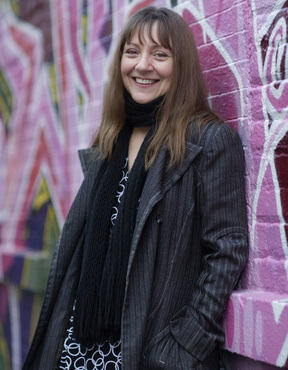By Danielle Girard
 playwright Liz Duffy Adams
playwright Liz Duffy Adams “Some years ago a friend asked me to write a verse prologue for her production of The Rover. I’d never read or seen Behn so I read several of her plays and biography and, of course, began to find her extraordinarily interesting,” says Adams.
As Adams explains it, Aphra Behn came from a modest background, but formed bonds with the aristocratic family for which her mother served as a wet nurse. Behn educated herself by using their extensive library and later developed connections that would land her a job spying for the English crown in the 1660s. Her life, by modern day standards, was certainly unique. She was widowed in 1667, ended up in debtor’s prison during her espionage career, and wrote over a dozen successful plays, as well as verse and fiction.
“She’s such an exciting person. When you do any research about her, I mean—there was no place in that society, that culture, at that time for her, and she created a place for herself,” Adams went on to say.
Writing the prologue for her friend’s production of The Rover sparked Adams’ desire to explore Behn through writing. She wrote a 10-minute rhyming couplet play, Aphra Does Antwerp, about Behn for a festival in 2001, and for years since has been trying to find an entry point for a full-length play.
The opportunity came in 2008 with a New Dramatists play workshop in New York. The playwright spent two weeks feverishly writing Or, in a tiny attic room—where August Wilson used to write—and workshopping the play with actors. “I used Aphra’s work as a jumping off point and inspiration,” explains Adams, “without aiming at a pastiche or copy.” She also tried to avoid writing “a stodgy, old-fashioned biopic type play. I wanted it to be a play of our time.” The resulting farce mixes modern and classic, prose and verse. It is full of gender bending, intrigue, and mad-cap antics—elements of Restoration Comedy that are equally hilarious today.
Or, captures Behn on the cusp of the transition between her life as a spy and as a playwright, two realms—theatre and espionage—which Adams believes have much in common.
“There’s a lot of things having to do with masking and disguise; masking and revelation; hiding and revealing and negotiating as she had to in a world in which it was very brave to be yourself,” elaborates Adams. “And this is something I think we’re all kind of familiar with too, in our own ways.”
These timeless themes inspired Adams to use Or, to draw thematic parallels between the 1660s, the 1960s (the era of her childhood), and present day. “I’m interested in writing historical plays because I’m interested in the cyclical view of history, the way that things keep coming around over and over and over again and the parallels that exist between eras—the ways in which they’re the same and the ways in which they’re different,” explains Adams. In Or, these thematic parallels often manifest themselves in the notion of freedom: personal freedom, sexual freedom, political freedom, and freedom of ideas.
Or, serves as a break from Adams’ traditional body of work. “My previous work has been largely in the realm of science fiction, however unlikely a theatrical genre that may be: post-apocalyptic settings,” says Adams. “I have noticed that there is a through line through all my work. It seems that the one thing that makes it possible for me to write a play is when it is, on some level, about recreating civilization after or during catastrophe. Whether that’s a destroyed, embittered London, like in Or, or a post-apocalyptic world.”
Adams is intrigued by the sense of renewal that arises with the recreation of a civilization after destruction. She explores the existence of a “subculture that can look incredibly naïve, but is exactly what gives us hope” in such times. Adams explains that the characters of Or, are perfect examples of “a subculture of artists and thinkers and people who actually, as Elvis Costello sang, want to know ‘What’s so funny ‘bout peace, love and understanding?’”
Adams hopes that Or, offers an exciting and fun evening of entertainment that provides audiences with a dose of hope and joy. “I think people sometimes strangely underestimate audiences and think they need to be jolted,” stresses Adams. “I want them to feel awake, the way I want to feel awake when I’m in the theatre, thinking and feeling. And I hope I’ve helped to create an environment for that kind of experience.”



